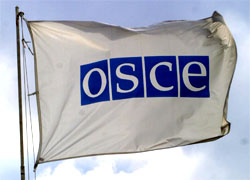Mandate of OSCE Office in Minsk – not a single sidestep
6- 6.01.2010, 11:55

The Belarusian authorities extended a mandate of the OSCE Office in Minsk, but restricted its activity and preserved the right to close it in any moment.
The mandate of the OSCE Office in Minsk is extended until December 31, 2010. The statement of the Ministry of Foreign Affairs of Belarus makes strict conditions of the mission’s work and says there are no objective reasons today for the OSCE to have a field mission in Belarus, Deutsche Welle reports.
We remind that Uladzimir Makei, the head of the President’s Administration said in September 2009: “The Belarusian side has to thoroughly study the prospects of the OSCE Office in Minsk”.
Politologists forecasted the prospects of the OSCE Office would be bargaining object in relations between Belarus and West. Cecilia Wigstrom, acting head of the OSCE working group on Belarus, said during her visit to Belarus in December she hoped the mandate of the OSCE Office would be extended as a New Year gift. The “gift” was made, but with a reservation.
In case “the OOM fails to follow its mandate and conducts activities that go beyond the agreed parameters, the Belarusian side reserves the right to terminate the activities of the OSCE Office in Minsk,” the MFA’s statement says.
German diplomat Benedikt Haller has been appointed new head of the office. Official Minsk hopes he will “ensure continuity and constructive spirit in his work, with sufficient focus on securing a strong correspondence of the Office activities to the aims and parameters of the agreed mandate”.
What office is not needed
To a question if Belarus needs the OSCE Office, Andrei Sannikov, a former deputy foreign minister and the leader of the civil campaign “European Belarus”, told in an interview to Deutsche Welle the OSCE Office is needed if it fulfils the conditions provided by the OSCE documents. But if the mission tries to flirt with the regime, it is not needed, the politician believes. “The last head of the OSCE Office was clearly trying to work for the regime of Lukashenka. Such an office can bring nothing but harm,” Andrei Sannikov supposes.
According to him, OSCE has its offices in the so called problem countries, and problem of Belarus is evident: “absence of democracy and dictatorial regime”. Thus, Sannikov thinks, following the OSCE principles, first of all the right to choose the country’s authorities and control over electoral process, is vital for Belarus. “But this should be the OSCE Office, not an office of Lukashenka’s administration,” the former diplomat adds.
Under previous head of the Office Hans-Johann Schmidt, Sannikov goes on, the office performed a supporting role for adopting some decisions by the OSCE. As the leader of “European Belarus” thinks, one cannot say Schmidt didn’t work, but “he was afraid of taking an active stand on the issues that must be primary in the mandate, namely human rights”.










